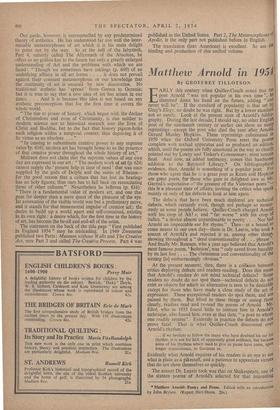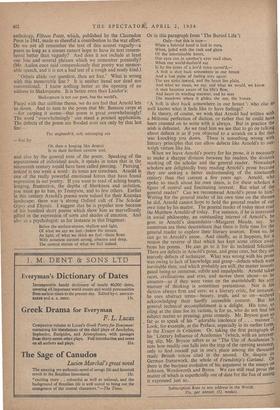Matthew Arnold in 1954
By GEOFFREY TILLOTSON EARLY this century when Quiller-Couch noted that 1115 poet Arnold " was not popular in his own time '', 11,° slammed down his hand on the future, adding "and never will be". If the standard of popularity is that set by Gray's Elegy, no doubt he was right. But by a lower standard not so surely. Look at the present state of Arnold's biblio' graphy. During the last decade, I should say, no other English poet of the nineteenth century or earlier can show so rnanY reprintings—except the poet who died the year after Arnold, Gerard Manley Hopkins. These reprintings culminated le 1950 when the Oxford University Press reset the poems complete with textual apparatus and so produced an edition, which, until the poems are fully annotated in the way so clearly pointed out by Lowry and Tinker's Conunentary, must remain final. And now, as added testimony, comes this handsome, addition to the Reynard Library.* On bibliographical evidence, then, Arnold is something of a popular poet. For those who agree that he is a great poet as Keats and Hopkins are great poets, for those who gaze in delighted awe at Mr. Garrod's superlative—" the greatest of the Victorian poets "-- this is a pleasant state of affairs, inviting the critics who speak mainly or only of his defects to look at him again.
The defects that have been much deplored are technical defects, which certainly exist, though not perhaps so numer: ously as some people believe. Quiller-Couch charged Amok', with his crop of Alt! s; and " far worse " with his crop 01 italics, " a device almost unpardonable in poetry . . . . Nor had Arnold an impeccable ear for rhyme." Then—at a bound to come nearer to our own day—there is Dr. Leavis, who took a sonnet of Arnold's and rejected it as, among other thingS,, showing throughout a " dead conventionality of . . . phrase • And finally Mr. Bateson, who a year ago believed that Arnold's most famous poem, ' Isolation', was " only saved from banality by its last line . . .. The clumsiness and conventionality of the writing [is] embarrassingly obvious." anthology, Fifteen Poets, which, published by the Clarendon Press in 1941, made so cheerful a contribution to the war effort. Do we not all remember the text of this sonnet vaguely—a poem so long as a sonnet cannot hope to have its text remem- bered better than vaguely? And does it not include at least one line and several phrases which we remember pointedly? (Mr. Auden once said compendiously that poetry was memor- able speech, and it is not a bad test of a rough and.ready kind.) ' Others abide our question, thou art free.' What is wrong with this memorable line ? It is neither banal nor dead nor conventional. I know nothing better as the opening of an address to Shakespeare. It is better even than Landor's:
Shakespeare is not our poet, but the world's.
Faced with that sublime theme, we do not feel that Arnold lets us down. And to turn to the poem that Mr. Bateson carps at —for carping it seems—that poem is great overwhelmingly! The word `overwhelmingly' can stand a pointed application. The defects of the poem are flooded over not only by that last line—
The unplumb'd, salt, estranging sea Oh then a longing like despair is to their farthest caverns sent,
and also by the general tone of the poem. Speaking of the separateness of individual souls, it speaks in tones that in the nineteenth century would have been called piercing. Piercing' indeed is too weak a word : its tones are trenchant. Arnold is one of the really powerful emotional forces that have found expression in our poetry. If you want to read of aching hearts, longing, frustration, the depths of blankness and isolation, you must go to him, to Tennyson, and to few others. Earlier in this century Arnold's poems were valued for their Keatsian landscape; there was 'a strong Oxford cult of The Scholar Gipsy and Thyrsis. I suggest that'he is popular now because of his hundred short poems which show him as marvellously gifted in the expression of sorts and shades of emotion. And also as a psychologist: as for instance in this fragment: Or in this paragraph from The Buried Life': Only—but this is rare—
When a beloved hand is laid in ours, When, jaded with the rush and glare Of the interminable hours, Our eyes can in another's eyes read clear, When our world-dcafen'd ear Is by the tones of a lov'd voice caress'd,— A bolt is shot back somewhere in our breast And a lost pulse of feeling stirs again: The eye sinks inward, and the heart lies plain, And what we mean, we say, and what we would, we know.
A man becomes aware of his life's flow, And hears its winding murmur, and he sees The meadows where it glides, the sun, the breeze.
A bolt is shot back somewhere in our breast ': who else so well knows what it feels like to have feelings? In theory, of course, we wish that Arnold had written with a Miltonic perfection of diction, or rather that he could have been counted on to write with it always. But in practice the wish is defeated. As we read him we see that to go on talking about defects is as if you objected to a scratch on a fist that was knocking you down. There is something wrong with literary principles that can allow defects like Arnold's to out- weigh virtues like his.
When we leave Arnold's poetry for his prose, it is necessary to make a sharper division between his readers, the division marking off the scholar and the general reader. Nowadays scholars are delightedly busy reading Arnold's prose because they are seeking a better understanding of the nineteenth century than that current a few years ago. Arnold, who spoke so much about his own times, is for these scholars 3 figure of central and fascinating interest. But what of the general reader? Can we recommend Arnold's prose to him? Writing for the general reader of his own time on the themes he did, Arnold cannot hope to hold the general reader of our own time by his matter. The general reader of today must read the Matthew Arnolds of today. For instance, if he is interested in social philosophy, an outstanding interest of Arnold's, he goes to Arnold's descendants—Margaret Meade, say. So numerous are these descendants that there is little time for the general reader to explore their literary sources. Even so, he can go to Arnold's' prose. And chiefly, as it happens, for a reason the reverse of that which has kept some critics away from his poems. He .can go to it for its technical felicities. There are defects in Arnold's prose, and great ones, but they are scarcely defects of technique. What was wrong with his prose was owing to lack of knowledge and grasp—defects which were inevitable then, and which probably are still,pie matter investi- gated being so immense, subtle and impalpable. Arnold takes races, civilisations and eras, and moves them about—so he assumes—as if they were vases on the mantelshelf: his airy manner of thinking is sometimes pretentious. Nor is his diction always firm and sure; as a literary critic, for instance, he uses abstract terms—beauty, truth, and so on—without acknowledging their hardly accessible content. But his general technical accomplishment is a delight. His tone, so riling at the time for its victims, is for us, who do not find his subject matter so pressing, great comedy. Mr. Bryson goes so far as to speak of his " adorable insolence of . . . manner Look, for example, at the Preface, especially in its earlier fora to the Essays in Criticism. Or, taking the first paragraph of his Literary Influence of Academies' (which, with an interest- ing slip, Mr. Bryson refers to as The Use of Academies 1, note how readily one falls into the trap of the opening sentence, only to find oneself put in one's place among the thousand ready British voices cited in the second. Or, despite its German framework, the whole of Friendship's Garland. Of there is the buoyant evolution of his argument in the essays on Johnson, Wordsworth and Byron. We can still read prose the matter of which is superficially out of date for the fun of seeing it expressed just so.



















































 Previous page
Previous page